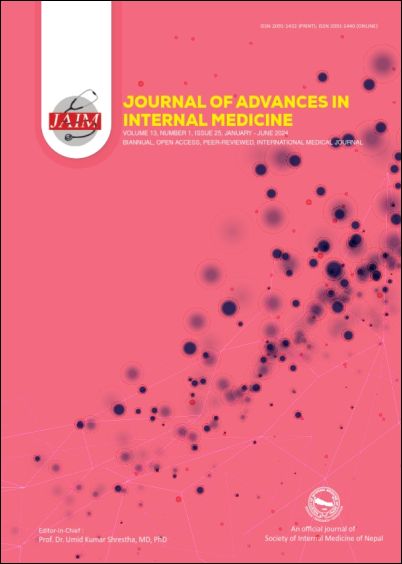Quality Indicators of Colonoscopy: Are we meeting the standards in Nepal?
DOI:
https://doi.org/10.3126/jaim.v13i1.68492Keywords:
Colonoscopy, Quality, Screening, StandardizationAbstract
BACKGROUND Colonoscopy is an important tool for management of colorectal disorders. Performance of quality colonoscopy requires a trained endoscopist, adequate resources, preparation and evaluation parameters for good outcomes. We conducted this study to emphasize the importance of quality practice in colonoscopy in our country as there is lack of standardization.
METHODS This is a retrospective observational study done at a referral center in Western Nepal. All the colonoscopies were done without sedation with two sachets of peglec powder 137.15 grams, each containing polyethylene glycol (118grams) dissolved in 2 liters of clean water each. Data of 1052 colonoscopies done during three years were retrieved from colonoscopy record section and analysed for important quality measures in use. Data entry and analysis was done in Microsoft Excel.
RESULTS A total of 1052 colonoscopies were included in this study. Pain abdomen (70.6%) was the commonest indication for colonoscopy and majority were male patients (53.4%). Good bowel preparation was achieved by split dosing of commercially available polyethylene glycol. Cecal and ileal intubation was achieved in 98% and 96% colonoscopies respectively, meeting the current recommendations set by the gastroenterology societies. No major complications occurred during the procedure.
CONCLUSION Important quality indicators could be achieved with colonoscopy done without sedation in resource limited settings also. Screening colonoscopy should be promoted for early detection and management of colorectal cancers in low-income countries like Nepal. Quality should be standardized and practiced in routine colonoscopy examination taking into consideration of patient comfort.
Downloads
Downloads
Published
How to Cite
Issue
Section
License

This work is licensed under a Creative Commons Attribution 4.0 International License.
This license enables reusers to distribute, remix, adapt, and build upon the material in any medium or format, so long as attribution is given to the creator.




